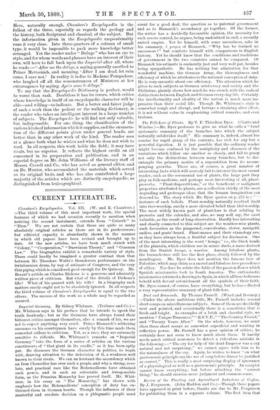Imperial Germany. By Sidney Whitman. (Trill:oiler and Co.)— Mr. Whitman
says in his preface that he intends to speak the truth fearlessly ; but as the Germans have always found their bitterest critics amongst themselves, also a remark of his, we are not to expect anything very cruel. Prince Bismarck's withering sarcasms on his countrymen have surely by this time made them somewhat callous to criticism. Yet, as a race, they are extremely sensitive to ridicule. Mr. Whitman's remarks on " Imperial Germany" take the form of a series of articles on the various constituents of " that giant in its cradle," as it has been aptly put. He discusses the German character in politics, to begin with, drawing attention to the indecision of it, a weakness well known to their rivals. We can un lerstand the ascendency which an Iron Chancellor has over such a people, and why a strong, reso- lute, and practical race like the Hohenzollerns have obtained such power, and in such an autocratic and irresponsible form, as the Prussian Monarchy has proved itself. Mr. Whit- man, in his essay on " The Monarchy," has shown with emphasis how the Hohenzollerns' conception of duty has en- throned them in German hearts. Though the influence of their Masterful and resolute decision on a phlegmatic people must count for a good deal, the question as to paternal government and as to Bismarck's ascendancy go together. Of the former, the writer has a decidedly favourable opinion, the necessity for such severe control, he argues, being undoubted in such a recently united empire. Yet he himself, with some uneasiness, asks in his summary, cl propos of Bismarck, " Why has he trained no successors ?" but comforts himself with comparisons in English history. Yet he should know that the conditions and traditions of government in the two countries cannot be compared. Of Bismarck his estimate is eminently just and very well put, besides being sympathetic. He has nothing but admiration for that wonderful machine, the German Army, the thoroughness and efficiency of which he attributes to the national conception of duty. He is very sarcastic about our efficiency. The attention which he gives to such subjects as German aristocracy and society and the Philistine, plainly shows how much he was struck with the radical distinctions between English and German every-day life. Certainly the intellectuality and ideality of the nation is much more im- pressive than their social life. Though Mr. Whitman's style is somewhat rough and abrupt, and betrays a straining after effect, it is not without value in emphasising critical remarks, and even truisms.


















































 Previous page
Previous page